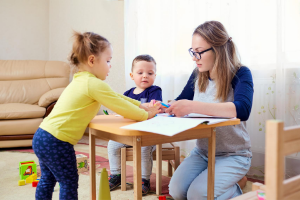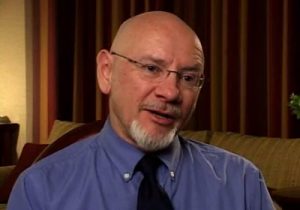Parents: Are You Losing Your Identity During Lockdown?
 Ever since the pandemic hit and lockdown started, I’ve kept in touch with friends at various stages of parenthood. One was about to give birth, several were raising toddlers, many were taking on homeschooling, and a few were preparing for the last summer they’d spend with their kids before sending them off to college. While the challenges each family faced were unique to their dynamic, many likened the feeling of being shut inside their house to the earliest stage of parenthood when they brought their newborn home for the first time.
Ever since the pandemic hit and lockdown started, I’ve kept in touch with friends at various stages of parenthood. One was about to give birth, several were raising toddlers, many were taking on homeschooling, and a few were preparing for the last summer they’d spend with their kids before sending them off to college. While the challenges each family faced were unique to their dynamic, many likened the feeling of being shut inside their house to the earliest stage of parenthood when they brought their newborn home for the first time.
The first weeks of a new parent’s life tend to be both sheltered and filled with an intense combination of precious moments and new anxieties. These early days on lockdown with our kids hold certain similarities: a deep instinct of protection entangled with a strong sense of isolation from the outside world. Many new parents feel as if their old world is forever left behind as a new set of priorities comes to the forefront.
From that moment when we bring our kids home, many of us enter into a dance of determining what parts of our identity we’re losing and what we’re gaining. Striking the balance of maintaining fundamental pieces of who we are and what lights us up with the new, exciting role of being a parent becomes a key determinant of our happiness and fulfillment as individuals.
While it’s true that being a parent is one of the most important things we’ll ever be, it is not all of who we are. We are all multi-dimensional individuals: partners, friends, siblings, professionals, artists, innovators, athletes, etc. Forgetting key parts of ourselves can take a toll on our mental health; moreover, it denies our kids the experience of seeing their parents as happy and fulfilled people in and of themselves – role models in the most authentic and well-rounded sense.
The challenge of maintaining our sense of self, while tending fully to the needs of our kids was hard enough pre-pandemic. Yet, nowadays parents are being asked to adopt the additional roles of teacher and full-time caretaker. Many are doing this while juggling their professional responsibilities along with new household safety and health demands. Parents who can’t stay home are literally being asked to risk their lives to do jobs that put food on the table.
With all these new responsibilities comes an unbelievable amount of stress and leaves little time for parents to connect to the things that have meaning to them personally aside from their kids. If there is one thing that I would say to these parents, it’s that it is okay to miss yourself and all the other things that made you YOU. You should not ignore your needs or feel guilty for having them.
In addition to missing aspects of ourselves, many parents have adopted a new level of guilt around not living up to expectations. Many of us walk around with a “critical inner voice” filling our heads with should’s and should not’s: You should want to be a 24-hour parent. You should spend more time helping the kids with their schoolwork. You should make sure they’re having enough fun. You shouldn’t let them be on their devices. You shouldn’t let them eat that. You shouldn’t work all night.
In addition to the guilt of not living up to our own demands, we tend to be extremely hard on ourselves about our performance as parents. This can be particularly true lately, as many parents find themselves having more self-critical “voices” about the new tasks they’re taking on. You’re so bad at teaching them. They won’t even listen to you. You don’t know what you’re doing. You’re failing at everything. Other people are doing it so much better than you. You can’t do this!
This negative headspace we enter makes it even more difficult to reconnect to a sense of who we are and to get on a path toward feeling like ourselves. One way to change this outlook is to wholeheartedly embrace self-compassion. According to researcher, Dr. Kristin Neff, self-compassion comprises three elements: self-kindness versus self-judgment, mindfulness versus over-identification with thoughts and feelings, and common humanity versus isolation.
Self-kindness: Any time we feel like tearing into ourselves, we should instead treat ourselves the way we’d treat a close friend in the same situation. Maybe we interacted with our kid in a way we didn’t like. Rather, than hating ourselves and getting lost in self-attacks, we can acknowledge our stress and frustration and actively choose to be different in the next interaction. Self-kindness allows us to recognize our struggle but face our mistakes, rather than burying them or beating ourselves up about them.
Mindfulness: When we practice mindfulness, we accept the fact that thoughts and feelings will come along that don’t serve us. Yet, rather than reacting at their whim, we can allow these thoughts to pass by like clouds over a mountaintop. We don’t need to be carried away by them. So many of our thoughts these days tend to center on the past or the future, but the only moment we can experience is the present. Staying present allows us to connect to pieces of our lives that hold meaning and bring us joy.
Common humanity: Though we may be more isolated in a physical sense, we have never been more connected through a common experience than during this global crisis. Common humanity asks us to recognize that we are not alone in our suffering. We can feel for ourselves, our sadness and our fear without feeling victimized or like we are all alone in our pain.
People who have lost loved ones to Covid-19 know that the steps we take to keep one another safe are worth any amount of sacrifice. Yet it’s still okay to acknowledge that the losses we face extend into many areas of our lives. The time we miss with our friends don’t just connect us to them but to a part of ourselves that may be dormant in the time of Covid-19. In our careers, studies are already showing how women are being setback by the pandemic, as they take on more childcare at home. The parts of our lives we are missing are very real to us.
Knowing this, we must find our own personal ways to seek out connection to ourselves. We should ask what old activities bring me meaning, i.e., talking openly and honestly with specific friends, being affectionate with my partner, exercising in a way that connects me to my body, cooking a special meal, or watching a favorite movie.
We can also try new things that make us feel connected to ourselves and our families, i.e., baking, crafting, playing games, or taking a specific time together to just sit and talk. We can find a way to make moments precious to us by simply being present with whatever we’re experiencing. We should ask ourselves, “how do I feel right now? What do I see, hear, taste, and smell that brings me joy or pleasure?”
We can take a moment each day to write down or list what we’re grateful for as a way to center our minds on what gives each day meaning, even as the days are so unlike our normal lives. In doing this, we make space for who we are, and we show up as better, stronger, more fulfilled parents to our children.
Tags: child development, children, covid-19, pandemic, parenting, parenting advice, parenting skills, parents







